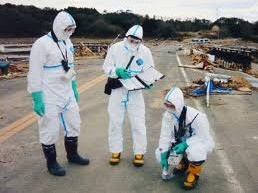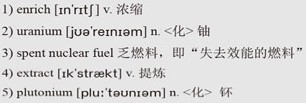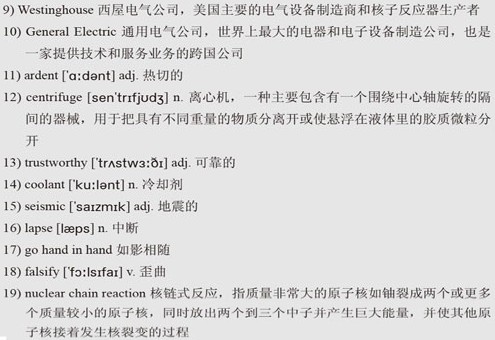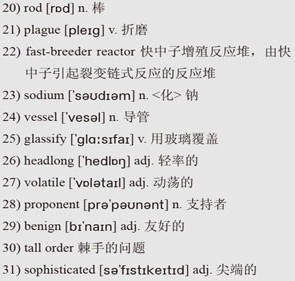文字难度:★★★☆
On March 11, when the first foreshock struck, my colleague Jeffrey Lewis and I were having lunch with senior industry officials at Japan's controversial Rokkasho Reprocessing Plant. That facility both 1)enriches 2)uranium and reprocesses 3)spent nuclear fuel to 4)extract 5)plutonium, two processes that can also be used to make nuclear weapons. We were in the country to tour its nuclear facilities—an arrangement designed to show how far Japan was prepared to go to convince the international community that its facilities were only for peaceful purposes.
3月11日,当地震的第一波前震来袭,我和同事杰弗里·刘易斯正与资深工业界高官在日本备受争议的六所村核燃料处理厂里享用午餐。这个处理厂既提炼浓缩铀又对乏燃料进行再加工来提炼钚——制造核武器也会涉及到这两个过程。我们当时在日本参观其核设施——这次参观旨在向世人展示日本已作好充分准备,去说服国际社会相信其“和平用核”的决心。
 Few countries in the world—and no other non-nuclear-weapon state—are as invested in nuclear power as Japan. It is already the world's third largest nuclear energy producer (after the United States and France) with ambitious plans for providing half of its electricity from nuclear power. Japan is also a major nuclear power plant exporter, with 6)Toshiba and 7)Hitachi having some time ago 8)wrested control of the nuclear divisions of 9)Westinghouse and 10)General Electric.
Few countries in the world—and no other non-nuclear-weapon state—are as invested in nuclear power as Japan. It is already the world's third largest nuclear energy producer (after the United States and France) with ambitious plans for providing half of its electricity from nuclear power. Japan is also a major nuclear power plant exporter, with 6)Toshiba and 7)Hitachi having some time ago 8)wrested control of the nuclear divisions of 9)Westinghouse and 10)General Electric.
世界上很少国家——包括其他无核武器国家——像日本那样在核能上投资如此之大。日本已成为(继美国和法国之后)第三大核能制造者,并雄心勃勃地计划要利用核能来供应一半的国民用电需求。日本同时还是核电站主要出口国之一,东芝和日立很早之前就打破了美国西屋电气公司和通用电气公司在核分裂技术上的霸主地位,分得一杯羹。
Japan's 11)ardent pursuit of nuclear energy has sprung from a deep sense of vulnerability. Lacking coal, oil, natural gas, or other fossil fuels, Japan, particularly after the oil crises of the 1970s, has seen nuclear power as a means of providing energy security. And it has built a new generation of 12)centrifuges for uranium enrichment in a bid to ensure that it is not vulnerable to a cutoff in supply of nuclear fuel, even if its main providers—countries like France and the Netherlands—seem pretty 13)trustworthy.
日本对核能的热切追求源于其根深蒂固的脆弱无助感。缺乏煤炭、石油、天然气以及其他化石燃料,特别是经过了上世纪70年代的石油危机之后,日本已视核能是确保能源供应的手段之一。而且它已为铀浓缩建造了新一代离心机,力求保证即使核燃料的供给中断,自己也不会处在被动位置,尽管其主要核燃料供给国——法国和荷兰等国家——似乎相当可靠。
Yet, Japan's efforts to ensure its energy security have created other kinds of insecurity. The loss-of-14)coolant accidents affecting the Fukushima nuclear reactors are far from the first nuclear accidents in Japan, where disturbing 15)seismic conditions and technical and communications 16)lapses have often seemed to 17)go hand in hand. For example, only four years ago, a 6.8 magnitude earthquake set off a fire at the Kashiwazaki-Kariwa reactor in northwestern Japan that lasted for two hours and led to a radioactive water leak. The plant was subsequently shut for 21 months. In 2003, 17 nuclear plants were shut down temporarily following a scandal over 18)falsified safety inspection reports. In 1978, one of the plants damaged in a tsunami had a 19)nuclear chain reaction continue for seven hours after all such reactions were supposed to stop; the control 20)rods—meant to halt the reactions—had slipped out of position.
然而,日本为确保稳获能源而作出的努力衍生了其他的危险。在日本这个地方,频繁扰人的地震与技术通信中断如影相随,这次冷却剂缺乏的意外影响到了福岛核电站,这和日本早期的核能事故大不相同。例如,仅在四年前,位于日本西北部的柏崎刈羽核电站因6.8级地震而着火,该场大火持续了2个小时,进而引起了放射性水泄漏。该核电站事后被关闭了21个月之久。2003年,17座核电站由于安全检查报告作假的丑闻而暂时被关闭。1978年,其中一座核电站在海啸中受损,一个核链式反应持续了7个小时,本来在出现事故时这类反应要马上自动停止的;归咎起来,是用来中断反应的控制棒震滑错位了。
The efforts to build a closed fuel cycle by extracting and reusing plutonium produced in Japan's nuclear power plants have also been 21)plagued by troubles. The advanced Monju 22)fast-breeder reactor was just beginning to operate in 1995 when the liquid 23)sodium coolant it used leaked and led to a fire. The reactor only reopened a year ago. Soon afterward, a three-ton machine involved in refueling the reactor got jammed in the reactor 24)vessel, forcing another shutdown. It has yet to be removed. And the opening of the Rokkasho facility itself—which extracts plutonium from spent power reactor fuel, and is supposed to 25)glassify radioactive waste and produce plutonium fuel for Japanese nuclear power reactors—has been repeatedly delayed, most recently by problems with the waste process. Reviewing the situation before the Fukushima tragedy, Japanese officials said that given a fresh chance, reprocessing and fast reactors might make little sense. But with billions of dollars already expended, it also made little sense to abandon their investments altogether.
日本想通过在国内核电站提炼和再用钚来建造一个密闭的燃料循环的努力也一再遭到打击。先进的文殊快中子增殖反应堆1995年刚投入使用不久就发生了液态钠冷却剂泄露并导致火灾。该反应堆一年前刚重新投入使用。但使用不久,一个反应堆内置用于加燃料的、重达三吨的机械装置塞住了导管,因此核电站不得不再次关闭。至今该卡住了的装置还没被清走。六所村既是从乏燃料中提炼钚,也是固化放射性废弃物并为日本的核电站生产钚燃料的设施,这一处理厂的运作却一再遭到延误,最近是由于废弃物处理的问题。在福岛核泄漏的悲剧发生前,日本官员在检讨问题的时候说,转念想想,乏燃料再处理以及快速反应堆都是不该启动的项目。但是,都已经投入了数十亿的巨额,要他们放弃这些投资项目也是不可能的。
Japan must first deal with the crisis at the Fukushima plants, and its nuclear workers have demonstrated incredible personal heroism in doing so. It then must institute measures to limit future radiation exposure, including the closure of many of the six Fukushima Daiichi reactors. But in the longer term, the nation—as well as others—may want to think long and hard about whether its 26)headlong pursuit of nuclear energy is indeed making it more secure. As the memories of 1979 Three Mile Island and 1986 Chernobyl accidents have faded and the dangers of global warming and reliance on the highly 27)volatile Middle East have increased, nuclear energy has appeared to be an increasingly attractive option. Many newfound 28)proponents of nuclear energy seem to have forgotten that nuclear power is more than a way of boiling water. It attempts to transform the energy that has powered the world's most dangerous weapons into something 29)benign. That is a 30)tall order for any society, even one as 31)sophisticated and technically proficient as Japan.
日本必须先处理福岛核电站危机,在此过程中,其工作人员表现出了令人难以置信的大无畏的个人精神。然后,日本必须想办法防止将来出现辐射物扩散,包括关闭福岛六个核反应堆的大部分运作。但从长期来看,日本——包括其他国家——可能要好好想想它们轻率决定使用核能会否令国家更安全。虽然有关1979年三里岛与1986年切尔诺贝利核电站事故的记忆已随时间慢慢淡去,但全球变暖以及对非常动荡的中东的依赖不断加深,使得核能看上去是一个越发吸引人的选择。许多新兴的核能支持者兴许是忘了核能的威力远不止是用来烧水那样简单。核能把世界上最危险的武器转变成某种“有利”的能源。这对任何一个国家来说都是“烫手山芋”,即便是像日本那样科技发达,拥有尖端技术的国家。




